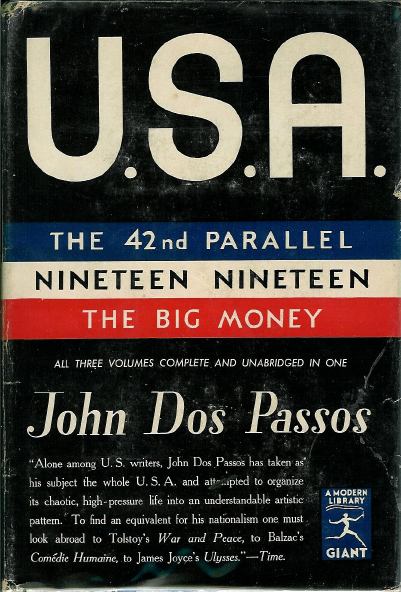Tuesday, February 13, 2018
Thoughts Provoked By Reading John Dos Passos' USA Trilogy
World War I was the event that first got me interested in history. I have maintained that interest, an interest so pure an abiding that I have never wanted to sully it by formally researching and writing about it. (Yeah, I'm a weird guy) This means that I occasionally fall down a Great War rabbit hole and have to keep digging until I come out on the other side.
Recently my interest in that conflict combined with my love of modernist fiction, and I picked up John Dos Passos' USA trilogy. So far, I have not been able to put it down. The forty minutes in the morning and afternoon I spend reading it while riding my New Jersey Transit commuter train to and from New York City have become cherished to me. It tops out at well over a thousand pages, and I am already half-way through.
It is a book famous for its devices, including stream of consciousness "Camera Eye" interludes, several interlocking narratives from the points of view of a broad range of characters, "Newsreels" os scraps from actual newspapers, and best of all, impressionistic biographies of key figures of the age.
I love this aspect of the book because what I call the "contemporary historical novel" is one of my favorite genres. These are typically novels where the author is recounting a recent past that the audience has lived through, and attempts to make sense of it. Dos Passos wrote the three novels (The 42nd Parallel, 1919, and The Big Money) in the 1930s, but wrote them about America right before, during, and after World War I. We get an amazing sweeping view of a certain time and place, and it's the kind of thing we had in the 21st century about our own recent past. If I had the time, talent, and inclination, it's what I'd write. Alas, I am no one's idea of a novelist.
Reading the trilogy I have been struck by how the modernist art of the early 20th century has maintained its power to provoke. When I show my students early abstract paintings they still get shocked or put off by them. It is great and a little sad that writers and artists so long ago can be so fresh. It says a lot about how timid and safe so much of what we consume today can be. Relatedly, I am flummoxed at how these books these days are not rated much, and have become an afterthought. call me crazy, but I'd put them above what Hemingway and Fitzgerald and Sinclair Lewis were writing at the time, and I like all of those authors.
In terms of the content of the books, I have made another sad realization. It used to be when I read novels written in the early 20th century that the chasms of class differences between some of the characters seemed quite alien to me. Nowadays those differences feel all too relatable. After four decades of neoliberalism American society has practically gone back to its New Deal self, a small band of affluence sitting above the toiling masses. At least Dos Passos is deeply concerned with those disparities and revolutionary ideas. Few writers today seem to be.
One of Dos Passos' motifs is the larger story of America's rise to global political and economic power. His trilogy is partly a meditation on the start of the so-called American Century. It is interesting to read it when we are now in that century's twilight. I only hope that there is a historian or novelist or film-maker out there who can document this era in all its tragedy and messiness the way that Dos Passos rendered his.
Subscribe to:
Post Comments (Atom)

No comments:
Post a Comment